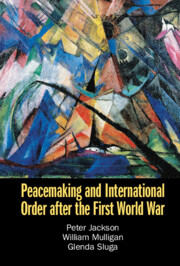Book contents
- Peacemaking and International Order after the First World War
- Peacemaking and International Order after the First World War
- Copyright page
- Contents
- Contributors
- Acknowledgements
- 1 Introduction
- Part I Ordering Concepts
- 2 Vocabularies of Self-Determination in 1919
- 3 Recasting the ‘Fabric of Civilisation’
- 4 State Sovereignty
- 5 The Crisis of Power Politics
- 6 The Challenge of an Absent Peace in the French and British Empires after 1919
- Part II Institutions
- Part III Actors and Networks
- Part IV Counterpoint
- Index
3 - Recasting the ‘Fabric of Civilisation’
The Paris Peace Settlement and International Law
from Part I - Ordering Concepts
Published online by Cambridge University Press: 18 May 2023
- Peacemaking and International Order after the First World War
- Peacemaking and International Order after the First World War
- Copyright page
- Contents
- Contributors
- Acknowledgements
- 1 Introduction
- Part I Ordering Concepts
- 2 Vocabularies of Self-Determination in 1919
- 3 Recasting the ‘Fabric of Civilisation’
- 4 State Sovereignty
- 5 The Crisis of Power Politics
- 6 The Challenge of an Absent Peace in the French and British Empires after 1919
- Part II Institutions
- Part III Actors and Networks
- Part IV Counterpoint
- Index
Summary
Upholding international law was crucial for the line of reasoning of the Allied powers during the Great War. German aggression was confronted with ideas about the sanctity of treaties, about sovereign equality, or about the binding force of law governing the relations between nations as standard of civilisation. But what happened with these rationalisations after the armistice of 1918? Mostly dismissed as propaganda, meaningless once the guns fell silent, the lingering influence of those ideas on the Paris Peace Conference in 1919 is often under-appreciated. This chapter assesses how the Allied invocation of international law informed and influenced negotiations in Paris. It demonstrates different understandings of legal arguments and international norms among the delegates and why, or why not, these were seen as meaningful for the restructuring of the international order. Even if there was no coherent plan among the Allies to promote the codification of international law, the peace settlement was characterised by an inherent normativity. Three features stand out: the formalisation of international relations through the League of Nations, the stabilisation of the international order by means of defining borders and peoples, and the effort to legally sanction violations of international norms. These ideas mark the recasting of nineteenth-century ideas about the ’fabric of civilisation’ in the shape of a new international order based on legally responsible nations and overseen by the League
- Type
- Chapter
- Information
- Publisher: Cambridge University PressPrint publication year: 2023



